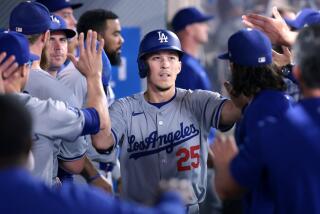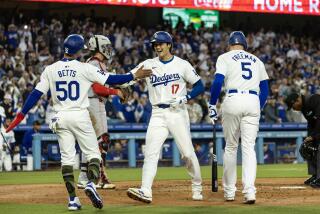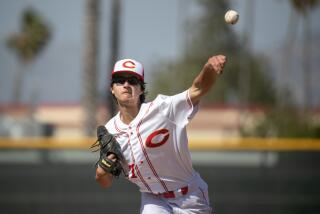He’s Craving More After Taste of Majors : Baseball: After stint with Brewers, Cypress High grad O’Leary hopes to leave minors for good.
Troy O’Leary’s experience in the major leagues consists of six days of putting on a Milwaukee Brewers’ uniform, two innings as a defensive replacement and two fly balls (he caught both).
Barely a sip of coffee.
But he did learn at least one thing: He really wants to go back.
“It was a thrill,” O’Leary said. “Just getting called up makes you feel really good, like they’re interested in you. I liked (Manager) Phil Garner and the guys. (Outfielders) Darryl Hamilton and Matt Mieske helped me out during games, talking about different situations. It was a great experience.”
O’Leary wasn’t even brooding on his flight back to New Orleans to rejoin the triple-A Zephyrs. After all, he had been replaced on the roster by Robin Yount, and where’s the shame in that?
“I knew it would happen,” O’Leary said. “When Robin came off the disabled list, someone had to go and I knew that someone was me. So I wasn’t really that disappointed. I was just glad I got the chance. Hopefully, I’ll get called back up in September and get the chance to stay up.”
O’Leary can deal with a detour on the road to the big leagues. It has already been winding and more than six years long. He signed a letter of intent to play football at Oregon State after graduating from Cypress High in 1987, but opted to sign a baseball contract with Milwaukee after being drafted in the 13th round.
He spent three years stuck in Class A, however, and at one point called Oregon State to see if they were still interested.
Last season with double-A El Paso left O’Leary clearly focused on baseball. He was named the Texas League’s most valuable player after leading the league in hitting (.334) and runs (92) and finishing second in RBIs (79) and fifth in stolen bases (28).
This season, he has made the jump to triple-A New Orleans without skipping a beat. His average is down to .289, but he has scored 21 runs, driven in 21 and hit five homers in 32 games.
“It’s great that Troy got to go up, even if it was just for a week,” Zephyr Manager Chris Bando said. “You play your whole life and always wonder if that day will ever come. Then when it finally does come, it really enhances your belief in your abilities. And it makes you feel good about the organization, that these people are paying attention, that they know what you’re doing in the minors.”
Bando, who has been O’Leary’s manager the last three seasons, doesn’t figure he’ll have the pleasure of writing his name on the lineup card much longer.
“He just keeps getting better and better,” Bando said. “When he gets up there and gets the chance to play every day for a while, we will not see Troy O’Leary in the minor leagues again.”
It took a few years for O’Leary to become a can’t-miss prospect, but then that’s not surprising for a guy who once considered baseball a way of staying in shape for the next football season.
“I really never liked baseball, to tell you the truth,” he said. “But after I signed, I started to see what baseball could do for me and I started to like it. Now, I’ve learned to like it a lot and I’m really glad I made the choice I did.”
He has come to that conclusion gradually, however. Soon after arriving in Helena, Mont., to play rookie-league ball, he decided they should have stopped with the first syllable when naming the town.
“I had no idea where I was, I just knew I hated it,” he said. “I called my mom and dad and begged to come home.”
His father persuaded him to stick it out for a while, and O’Leary slowly began to see a future in baseball. As he steadily improved, those around him began to see that future, too.
“I’ve had Troy the last three seasons now, and every year some facet of his game improves,” Bando said. “He’s focused on baseball now and he’s only going to get better.”
O’Leary, 23, was behind many of his peers who had been concentrating on baseball since boyhood, but he has been making up ground in huge strides the last couple of seasons.
Bando has been having a great time watching O’Leary seeking out weaknesses and turning them into strengths.
“It used to be he never hit the ball the other way,” Bando said. “He starts trying to do it and he leads the league in hitting. They used to question his defense but he’s really worked on his defense and now he’s one of the best outfielders we have.
“They used to talk about his base-running, so he steals 28 bases last year. We said he needed to work on his bunting and now he’s one of the best bunters on this club. And he used to strike out a lot and now he is the best two-strike hitter I’ve ever seen on the minor league level. I can’t tell you how many clutch hits he’s gotten with two strikes.
“Now, all he needs is a little more polish in all these areas to get him to the point that when he gets to the big leagues again, it will all be second nature.”
You’ll have to excuse O’Leary if he’s secretly hoping the Brewers are out of the pennant race come September. It could mean a chance for him to play on a regular basis after the rosters are expanded.
“I was very nervous and hopefully some of that will be gone if I get back there again,” he said. “I’m very confident at the plate. They know I can hit, so I’m just going to concentrate on stealing some bases and playing good defense.”
O’Leary arrived at this comfort zone as a hitter after falling into a long-ball trap during his third season in the minors. He hit 11 homers in 10 weeks and decided every pitch should end up a souvenir.
“I fooled myself for a while, but I’ve come to realize I’m not a home-run hitter,” he said. “I’m a gap-to-gap man, a line-drive man, a guy who can drive in runs. But I’m not a power hitter.”
Bando disagrees, but says it’s really just a matter of semantics.
“Troy’s got power,” he said. “Look at his doubles (27) and triples (eight) and his slugging percentage (.449) last year. Now, that’s what I call a power hitter.
“And with some maturity, he’ll hit more home runs, too, but that’s something that happens naturally. It’s not something you teach, it’s something you find out about yourself. He’s hit some long home runs and he knows he can hit the ball a long way. I wouldn’t be surprised if he got to the big leagues and flourished as a home-run hitter.”
O’Leary is doing everything he can to make sure he’s prepared for his next trip to the majors. Even if it means risking his life.
“I played in Venezuela last winter and that was pretty scary,” he said. “They had some kind of war going on and sometimes you could hear the gunfire. I just played and then went back to the hotel room, ordered room service and watched reruns on TV.”
Even that regimen is preparation for life in the majors. The only difference is Bill Cosby won’t be speaking Spanish.
More to Read
Go beyond the scoreboard
Get the latest on L.A.'s teams in the daily Sports Report newsletter.
You may occasionally receive promotional content from the Los Angeles Times.










